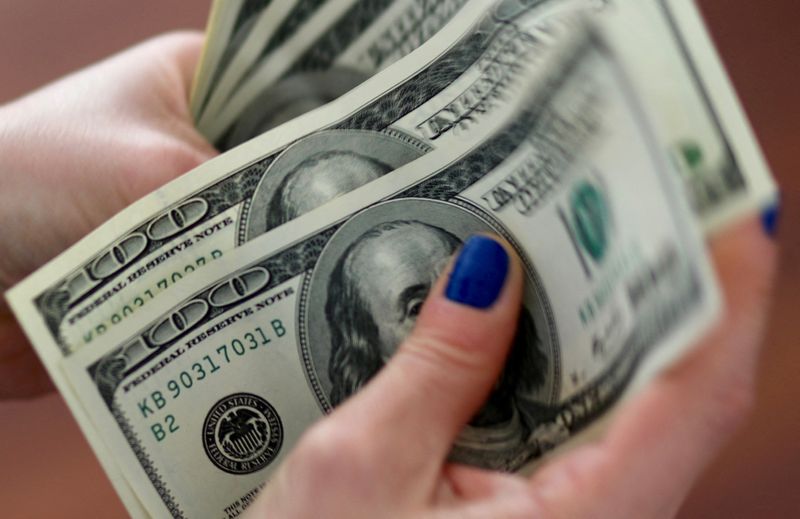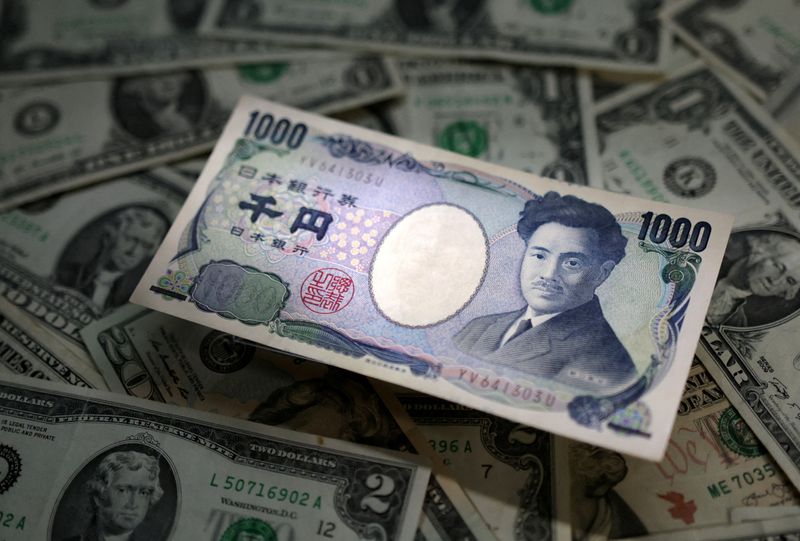By Herbert Lash and Iain Withers
NEW YORK/LONDON (Reuters) - The dollar posted its second-steepest weekly decline versus other major currencies this year on Friday, while the yen strengthened sharply, and the dollar traded below 150 yen, as concerns grow about the weakening global economic outlook.
Cooler-than-expected U.S. inflation data on Tuesday and Wednesday hastened market expectations for how soon the Federal Reserve will cut rates. Such a move would weaken a major dollar support and could come as early as next year's first quarter.
The dollar index, which measures the greenback against six other major currencies, slid to lows last seen on Sept. 1, while the yield on benchmark 10-year Treasury notes fell to a two-month low of 4.379%.
Data that showed U.S. single-family homebuilding increased marginally in October briefly supported the dollar, but with inflation the main market driver it remained lower on the day.
"The spate of recent data points towards progress being made on the inflation front," said Bipan Rai, North America head of FX strategy at CIBC Capital Markets in Toronto. "It really feels like the initial momentum now is for the dollar to move lower."
The dollar index fell 0.49% on the day, hitting a low of 103.85 that increased the greenback's decline over the past five days to almost 1.8% - its biggest weekly drop since mid-July.
"Everything is pointing towards a fourth-quarter slowdown in the United States," said Thierry Wizman, global FX and interest rate strategist at Macquarie in New York, adding that a key signal would be companies guiding growth expectations lower.
"They're not seeing the pricing power they saw in Q3 and they're not seeing the kind of enthusiasm on the part of customers that they were seeing in Q3 either," Wizman said.
The euro rose 0.52% to $1.0906 after Eurostat data confirmed year-on-year inflation in the euro zone slowed sharply in October.
The yen - punished broadly this year by dollar strength - broke the 150 mark for the first time in nearly two weeks, gaining 0.69% to 149.68 to the dollar. The U.S. currency is down about 1.4% versus the Japanese currency since Monday.
Japanese authorities do not have specific exchange-rate levels in mind when deciding when to intervene in the currency market, Deputy Finance Minister Ryosei Akazawa told parliament on Friday.
The yen's strength reflected the fact that "contracting growth concerns are rising" globally, said Lee Hardman, currency analyst at MUFG, adding that Japanese terms of trade were less impacted by falling energy prices.
Weaker-than-expected retail sales figures in Britain added to a slew of negative readings this week, but sterling nudged higher to $1.2458, up 0.42% on the day.
Sluggish data globally has raised concerns about economic prospects, but also suggests central banks may be winning in their fight against soaring prices.
Futures markets are pricing 93 basis points (bps) of cuts in the Fed's overnight lending rate by December 2024, market bets that have contributed to dollar weakness.
Money markets have also nearly fully priced 100 bps of rate cuts in the euro zone next year. Nonetheless, European Central Bank (ECB) policymakers Robert Holzmann and Joachim Nagel said on Friday the bloc must stand ready to raise interest rates again if necessary.

ECB President Christine Lagarde said earlier in the day that the EU needs a capital markets union, adding that neither heavily indebted governments nor banks can come up with the money needed to make the bloc more productive and independent.
(This story has been corrected to say that the dollar, not the yen, traded below 150, in paragraph 1)
